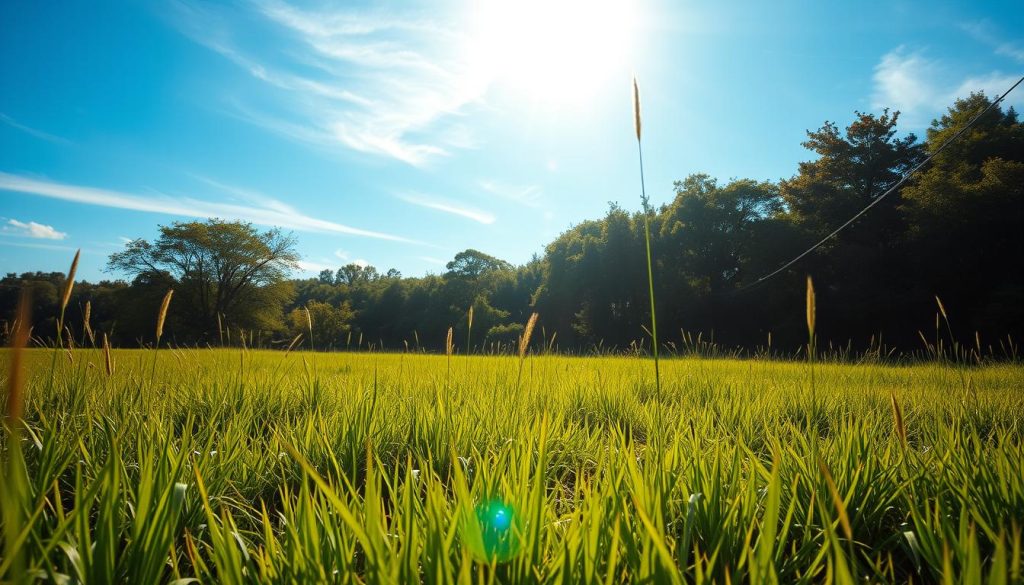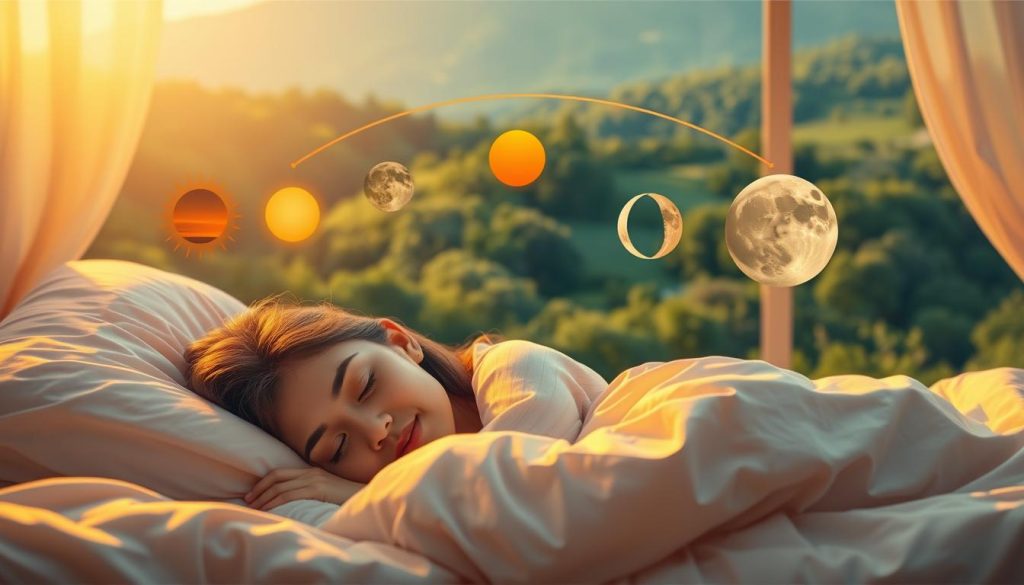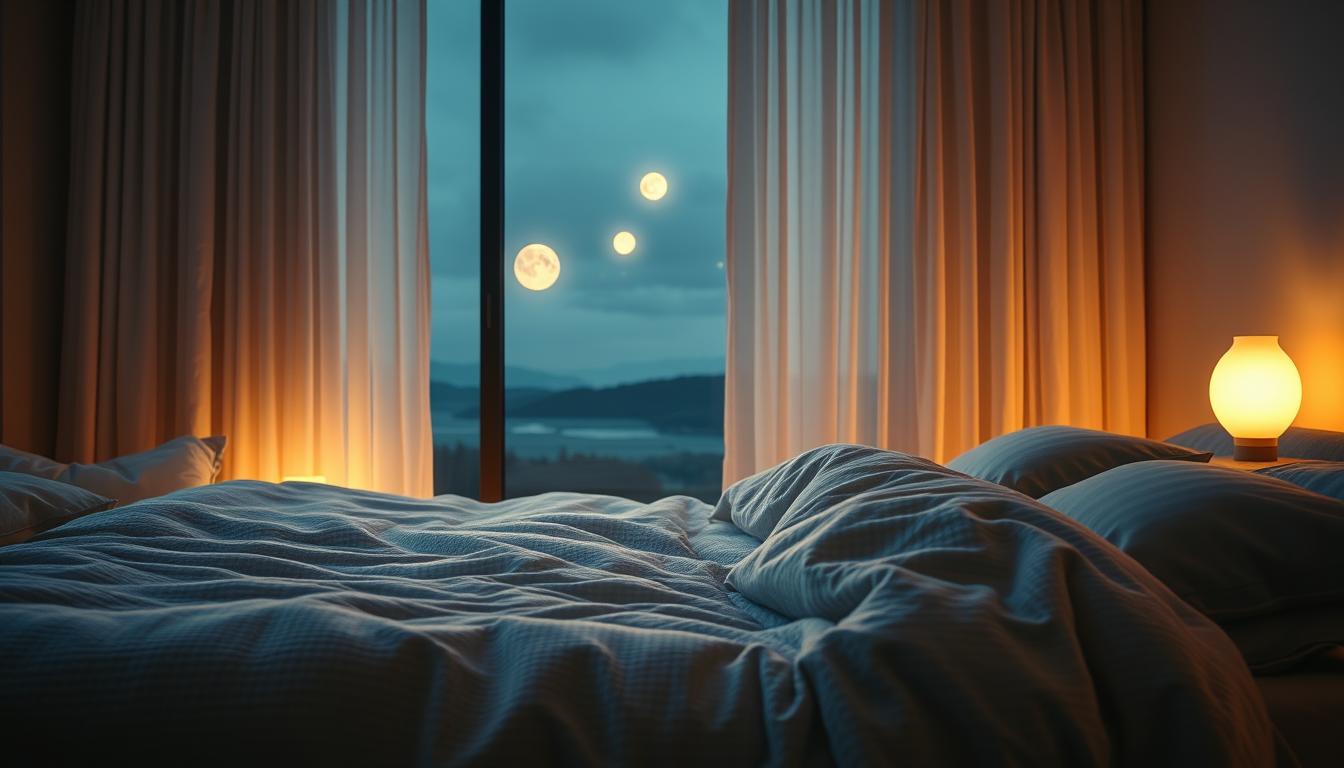Getting a good night’s sleep is more than just counting sheep. It involves the balance of negative ion therapy and circadian rhythm. These natural forces help our sleep patterns match our body’s cycles. This leads to better, more restful sleep.
We’ll look into the science of negative ions and circadian rhythms. We’ll see how the environment can improve our sleep quality. This is key to a good night’s rest.
The National Sleep Foundation and Harvard Health Publications have guidelines. Research in the Journal of Clinical Sleep Medicine also sheds light. We’ll cover how to achieve the best sleep health.
Stay with us as we dive into the benefits of negative ions and mood improvement. We’ll also discuss the importance of regular sleep cycles.
Introduction to Negative Ions and Circadian Rhythm
Understanding the balance of negative ions and circadian rhythm is key to better sleep. The world is moving towards holistic health, making this connection more interesting.
What are Negative Ions?
Negative ions are molecules with an extra electron. You find them in places like waterfalls, forests, and after storms. The International Journal of Biometeorology says they improve air quality and well-being. This helps with sleep.
What is Circadian Rhythm?
Circadian rhythm is like your body’s internal clock. It controls when you sleep and wake up, based on light and darkness. The National Institute of General Medical Sciences says it’s vital for health. It helps with sleep and body functions.
Importance of Both in Sleep Quality
Combining air ionization and a stable circadian rhythm boosts sleep quality. Environmental Health Perspectives shows negative ions can improve sleep. This supports the need to match these elements with your body’s clock.
| Element | Benefits |
|---|---|
| Negative Ions | Improved air quality, enhanced well-being, and better sleep regulation |
| Circadian Rhythm | Consistent sleep-wake cycles, increased alertness, and overall health |
| Combined Impact | Optimal sleep quality, synchronized body’s internal clock, improved mental and physical health |
The Science Behind Negative Ions
Negative ions, or anions, are atoms or molecules with extra electrons. This makes them have more ionization energy. They are often found in nature, like at waterfalls, mountains, and beaches. Here, water molecules split apart, creating these beneficial ions.
A study in the Journal of Alternative and Complementary Medicine looked into negative ions. It found they can clean the air by removing pollutants and allergens. This helps our breathing and can even make us feel happier and less stressed.
Another study in Psychological Medicine found a link between negative ions and mood. These ions help increase serotonin, which is key for feeling good and sleeping well. Together, these benefits help us feel better overall.
Understanding Circadian Rhythm
Circadian rhythms control our sleep-wake cycles and happen every 24 hours. Light from outside plays a big role in these rhythms. When we see natural light, our brain starts to work on sleep-related tasks, like making melatonin.
The Role of Natural Light Exposure
Natural light is key to keeping our rhythms in sync with the world. During the day, it helps us stay awake and feel good by stopping melatonin production. Our eyes talk to the brain’s SCN, which is like our internal clock.

A study in the Sleep Health Journal shows how important morning sunlight is. It helps our body clock stay on track, leading to better sleep and health.
Impact on Melatonin Production
Melatonin is linked to sleep, made in the pineal gland and affected by light. In the dark, melatonin levels go up, telling our body it’s time to sleep. But light, like from screens, can stop melatonin production and mess with our sleep.
Research from the Journal of Pineal Research found that managing light can improve melatonin levels. By living in sync with natural light, we can sleep better every night.
How Negative Ions Improve Sleep Quality
Negative ions can greatly improve our sleep quality. They help clean the air and boost our mood. Both are key to a good night’s sleep.
Air Purification Benefits
Negative ions are great at cleaning the air. They stick to pollutants like dust and pollen. This makes the air cleaner and better for our lungs.
| Factors | Negative Ions | Impact on Sleep |
|---|---|---|
| Reduction in Allergens | High | Improved breathing, reduced snoring |
| Elimination of Pollutants | Significant | Cleaner air, fewer disturbances |
| Overall Air Quality | Enhanced | Better sleep environment |
Mood Enhancement Effects
Studies show that negative ions can make us feel better. They increase serotonin, helping us relax and feel less stressed. This is important for a good night’s sleep.
With these clean air benefits and mood boosts, negative ions are crucial for a great sleep space. Adding them to our lives can make a big difference in how well we sleep. This leads to a healthier, happier life.
Negative Ions and Circadian Rhythm: A Synergistic Relationship
The connection between negative ions and our body’s natural sleep-wake cycle is intriguing. Research from the Journal of Sleep Research and Chronobiology International sheds light on this bond. Negative ions in our surroundings can greatly affect our circadian rhythm, helping our body’s natural sleep cycle.
Negative ions play a crucial role in keeping our circadian rhythm stable and in sync. They help regulate melatonin, a hormone that controls sleep. This can make falling asleep easier and improve the quality of our sleep.
Let’s look at some key findings that show how ions and circadian alignment impact sleep:
| Factor | Role in Sleep Improvement | Influence on Circadian Rhythm |
|---|---|---|
| Negative Ions | Enhances air quality, reduces stress | Stabilizes circadian timing, promotes melatonin production |
| Circadian Alignment | Supports natural sleep-wake cycles | Ensures optimal sleep onset and duration |
Understanding the connection between ions and circadian rhythm is key. By combining these elements, we can improve our sleep and overall health. This approach helps us create a better sleep environment and supports our well-being.
The Health Benefits of Balancing Circadian Rhythm
Keeping your circadian rhythm in balance is good for your health. It helps your body and mind work better. This happens when your internal clock matches the day-night cycle.
Improved Sleep Quality
Good sleep starts with a balanced circadian rhythm. Being in natural light and sleeping at the same time every day helps. It cuts down on sleep problems and keeps you healthy.
Better Mood and Mental Health
Being in sync with natural light improves your mood. It helps control the chemicals in your brain that affect how you feel. Research shows it can also lower depression and anxiety.
Enhanced Physical Health
Staying in rhythm also boosts your physical health. The American Academy of Sleep Medicine says it strengthens your immune system and metabolism. It also helps your heart and improves digestion and performance.

| Health Aspect | Impact of Balanced Circadian Rhythm |
|---|---|
| Sleep Quality | Improved restorative sleep benefits |
| Mental Health | Mood stabilization and mental health improvement |
| Physical Health | Enhanced physical wellness and strengthened immune system |
Negative Ions in Everyday Life
Negative ions are key to better well-being. They’re found in nature. Knowing where to find them and how to bring them home can boost your health and happiness.
Sources of Negative Ions
Many natural places are full of negative ions. Here are some:
- Waterfalls
- Forests
- After thunderstorms
- Mountain areas
Studies in the Atmospheric Environment journal show these spots have lots of negative ions. They make us feel refreshed and energized.
Ways to Increase Negative Ion Exposure
To get more negative ions at home, try these tips:
- Use ionization devices: Many home gadgets release negative ions, cleaning the air.
- Houseplants: Spider plants and peace lilies naturally add negative ions indoors.
- Salt lamps: Himalayan salt lamps are known for their negative ion production.
- Running water features: Fountains and aquariums can also increase negative ions.
These methods, as the Indoor Air Journal explains, can make your air cleaner and your health better. By using them, you can make your home healthier and more lively.
Tips for Maintaining a Healthy Circadian Rhythm
Keeping your circadian rhythm in sync is key for good sleep and health. Making smart daily changes and paying attention to diet and exercise can help a lot.
Daily Routine Adjustments
Changing your daily habits to match natural light can help your rhythm. Morning sunlight helps set your internal clock. It makes you feel awake during the day and ready for sleep at night.
Avoiding blue light from screens at night also helps sleep quality. This light can trick your body into thinking it’s still daytime.
Role of Diet and Exercise
What you eat and how much you sleep are closely connected. Eating a balanced diet full of nutrients can improve sleep. Foods like nuts, seeds, and turkey, which are high in magnesium and tryptophan, can help you relax and sleep better.
Exercise is also great for sleep. Regular physical activity, like aerobic exercises, can help regulate your rhythm. This leads to deeper, more restful sleep.
The Journal of Physiology found that doing moderate aerobic activity in the morning is best. It maximizes the sleep benefits.
By adjusting your daily habits and focusing on a healthy diet and exercise, you can improve your circadian rhythm. This leads to better sleep and overall health.
Combining Negative Ions and Circadian Rhythm for Optimal Health
Achieving optimal well-being is more than just one thing. It’s about mixing negative ions and following our natural circadian rhythm. These two elements work together to improve our health in a big way.
Research shows that our internal clock needs to sync with the sun’s light. At the same time, negative ions can make the air cleaner and lift our mood. Both are key for a healthy body and mind.
Let’s dive into how these two can help us stay healthy:
- Natural light helps our body clock. This leads to better sleep and overall health.
- Negative ions clean the air. This makes breathing easier and cuts down on allergies.
- These ions also make us feel happier. When our body clock is in sync, our mood improves even more.
By using these tips, we can live a healthier life. We can sleep better, feel happier, and be our best selves.
| Element | Benefit | Explanation |
|---|---|---|
| Negative Ions | Air Purification | Reduces pollutants, leading to cleaner air and better respiratory health. |
| Circadian Rhythm | Sleep Regulation | Aligns sleep-wake cycles with natural light for better sleep quality. |
| Combined Approach | Holistic Health | Integrating both elements enhances physical and mental well-being. |
Common Misconceptions about Negative Ions
Negative ions are often misunderstood, leading to doubts about their health benefits. Let’s clear up some common myths and share the scientific facts about negative ions.
Debunking Myths
Many think negative ions are only good when made artificially. But, nature itself is full of them. Waterfalls, oceans, and forests all have plenty of negative ions. These natural sources can boost mood and clean the air.
Another myth is that negative ions can fix all health problems overnight. While they do help with stress and air quality, they’re not magic solutions. To see real changes, you need regular use and lifestyle changes.
The Reality According to Science
Science backs up the benefits of negative ions. A study in the International Journal of Negative Ion Studies found they can lift mood and help with depression. Another study in the Journal of Environmental Psychology shows they can purify the air, which helps sleep.
Knowing the truth about negative ions helps us see their real benefits. They do improve health and sleep, but we should be realistic about their effects. Always look to credible scientific research for accurate information.
| Myth | Scientific Reality |
|---|---|
| Artificial ionizers are the only effective source | Natural sources such as waterfalls and forests are effective too |
| Negative ions cure ailments overnight | Consistent exposure yields gradual health benefits |
| Negative ions have no real effect | Studies show they improve mood and air quality |
Technology Solutions for Increasing Negative Ion Exposure
More people are learning about the good things negative ions can do. New tech helps us get more of these ions, which can make us sleep better and feel healthier. Let’s look at some top devices for this purpose.
Negative Ion Generators
Negative ion generators, or ionizers, are made to send negative ions into the air. They work by creating charged particles that stick to bad air stuff, making it fall. This makes the air we breathe cleaner and healthier.
Air Purifiers with Negative Ion Features
Air purifiers with ion technology are also great for getting more negative ions. These gadgets clean the air and add negative ions to it. They use filters to catch dust and pollen, and also send out negative ions to make the air better and help us sleep.
Studies from the American Journal of Respiratory and Critical Care Medicine and Consumer Reports show these devices work well. They clean the air and help us sleep better by adding negative ions.
The Role of Environmental Factors
Sleep quality is affected by many things, like where you live and the seasons. This part talks about how city and country living change sleep. It also looks at how the seasons affect our body clocks.

Urban vs. Rural Living
City sleep problems are big because of pollution, noise, and too much artificial light. These things mess up our sleep and make it less good. But, country areas have cleaner air, less noise, and less light pollution. This makes sleep better because of the natural environment.
| Factor | Urban Living | Rural Living |
|---|---|---|
| Air Quality | Lower | Higher |
| Noise Levels | Higher | Lower |
| Light Pollution | Higher | Lower |
| Access to Nature | Limited | Abundant |
Influence of Seasonal Changes
Seasons change our sleep patterns because of the daylight hours. More daylight in summer makes it harder to fall asleep. Shorter days in winter make us sleepier and go to bed earlier. Studies say that natural light helps keep our body clocks in sync with the seasons.
Case Studies: Real-Life Examples of Improved Sleep
Real-life sleep improvement case studies show how negative ions and circadian rhythms boost sleep. These stories prove the power of these methods in improving sleep quality.
Personal Experiences
Many people share their testimonials on negative ions online. Users of negative ion generators say they sleep better and feel better overall. Their stories show how clean air and stress relief lead to a good night’s sleep.
Scientific Studies
Scientific research also backs up the benefits of negative ions. Studies in the Sleep Journal show how negative ions help regulate sleep patterns. These findings confirm the scientific support for using negative ions as natural sleep aids.
Final Thoughts on Balancing Sleep with Negative Ions and Circadian Rhythm
Understanding the link between negative ions and our body’s natural rhythm is key to better sleep. Studies show that changing our surroundings and habits can improve sleep. Negative ions clean the air and boost our mood, while keeping our natural rhythm helps us sleep well.
The science behind using negative ions and natural light for sleep is interesting. It shows how we can improve our sleep naturally. By using negative ion generators and following our body’s natural sleep cycles, we can sleep better.
If you want to use these tips, think about what works best for you. This guide shows how important it is to look at sleep as a whole. It helps us find ways to sleep well, no matter where we live. The goal is to find a balance that makes us healthier and more rested.

